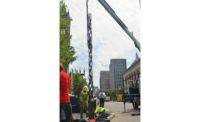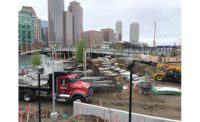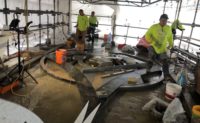MacKay Construction Services Inc. is currently building Martin’s Park on Boston's Fort Point Channel, a $13-million project to celebrate the lives of the Boston Marathon bombing victims.
Seven months after the 2013 marathon bombing, MacKay completed a playground that was designed to be accessible to children with special needs. Named for the late Boston Mayor Thomas Menino, the park stands outside Boston’s Spaulding Rehabilitation Hospital, where several bombing victims recovered, including the sister of the 8-year-old boy, Martin Richard, killed by the blast.
“We are a heavy-civil contractor,” says James MacKay, president and owner. “The reason we do jobs like this is the meaning of it.” MacKay, who is donating a portion of the work, adds, “This will be our generation’s Boston Public Garden.”
Martin’s Park, like Menino Park, will be inclusive and accessible to children of all abilities. Designed by landscape architecture firm Michael Van Valkenburgh Associates Inc., the park uses natural elements—logs, rocks and an undulating but wheelchair-friendly topography, for example—to create a safe play space for every child. “You don’t necessarily need to do a whole lot to offer a wide range of experiences,” Chris Donohue, senior associate at Michael Van Valkenburgh, said during a Jan. 26 presentation, organized by Design Museum Boston, on the park’s design.
Shortly after Donohue’s talk, workers poured the foundation for a 40-ft by 12-ft custom-made play ship. Made of mountain larch wood and fabricated in Germany, the ship will sit on a single 60-ft by 20-ft spread footing. Only a few other similar ships exist in the world, including one honoring Princess Diana in a London park. “For us, it was about creating something that had a lasting memory and [would be] larger than life for kids,” Donohue says.
Adjacent to the Children’s Museum, the 1.1-acre site is squeezed next to the Fort Point Channel. The park will include a series of one-story-tall slides, with city views and a water play garden. The park’s boundaries were expanded when the Children’s Museum allowed the team to build a garage over its existing open-air parking lot. A 35-ft-long pedestrian bridge over the park’s main walkway will connect the play space above the garage to another play area.
MacKay says the small urban site, long lead times for materials procurement, pile driving and tight plantings deadlines all have contributed to an “intense” project, which is scheduled to finish this fall.
A massive Jan. 4 storm, known as the “bomb cyclone,” further complicated matters. For instance, the site flooded; fortunately, it flooded after drainage was installed and before geofoam blocks were placed. MacKay says that bit of luck allowed the team to look into redesigning portions of the park with helical piles, which can handle future flooding better than geofoam.
Donohue says the design team doesn't want to add additional load to the existing site due to compressible soils and the existing seawall. He said his firm is working with McPhail Engineering (geotechnical engineers) and Nitsch Engineering (civil and structural engineers) to study the potential use of helical piles under the proposed retaining wall that would hold back new planted slopes. "This option would similarly avoid adding any additional vertical or lateral load to the existing seawall, but be a more efficient construction technique for this particular feature," Donohue says. "It would also reduce the amount of excavated materials that would need to be brought off site for disposal."
MacKay says the redesign should be able to be done without adding additional costs to a project that is almost entirely funded by private donations. Lauren Bryant, a project manager for Boston Parks & Recreation, says the project still needs slightly more than $1 million in construction funds.
After the storm cleared, the project team also benefited from unseasonably warm weather during a large concrete pour. “We say all the time on the jobsite that ‘Martin’s looking down on us,’ ” MacKay says.
Secure donations for the project can be made at the MR8 Foundation website. Donations of $10,000 or higher can be directed to The Fund for Parks & Recreation in Boston 501 (c)3 charitable foundation for Boston Parks) at 1010 Massachusetts Avenue in Boston, Ma.
This story was updated with new information on Jan. 31.






Post a comment to this article
Report Abusive Comment